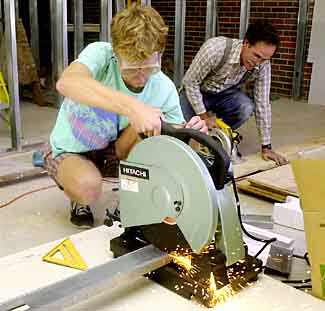OU students help Health for Friends expand
November 24, 2001By Barbara Quigley, LifeStyle Editor
photo by Bill Hefton/The Norman Transcript
The Norman Transcript

OU student John Campbell cuts a metal stud as Bill Bauman works in the background.
A non-profit clinic founded to serve the general medical, prenatal, dental and pharmaceutical needs of Norman’s medically underserved, provided more than 10,000 patient encounters last year.
That's up from previous years. Such growing pains have caused Health for Friends to outgrow its present location at 317 E. Himes. An addition to the building is under construction.
Health for Friends serves clients who fall through the cracks of the current health care system. Most would not receive medical care if not for Health for Friends.
The clinic began in an abandoned garage in 1985. The facility moved several times before construction of its own building at 317 E. Himes in 1992. A steady growth of patients has caused the organization to all but outgrow the present facility.
OU College of Architecture students have been busy this semester on a project that nearly doubles the size of the building. Professor Bill Bauman and his students designed and are physically building the addition.
Last semester, the students designed the structure and drew up the design, said Maurine Garton, the clinic's executive director. “This semester, they have actually built it. I'm so excited.
Johnny Thompson, a Tulsa architectural student, is one of 22 students working on the project. “I've always wanted to do something like this,” Thompson said.
“The students did it from the ground up,” said Garton. “When they're through, they will even do the landscaping. They will make the parking lot bigger and have greenspace in the parking lot.”
The materials were obtained through grants from the Sarkeys Foundation and the Mabee Foundation. Norman Regional Hospital supplied the seed money.
Health for Friends is also a United Way Agency and receives some funding from area churches.
“OU student volunteers do a lot of the work at the clinic,” said Julie Lovegrove, office manager.
“I like working in the prenatal clinic because it produces healthy babies,” said Sheila Bartels, R.N. “We educate the mothers and put a high emphasis on patient education. If you take good care of mom, you have healthy babies and fewer low birth weights. Low birth weight babies are costlier and it’s been found they have more special needs in school. They are more likely to need special education and be asthmatic. I talk to the expectant mothers about diet and nutrition and explain how drugs and alcohol can affect their babies.”
As of October, 340 pregnant mothers have passed through the clinic this year.
J.D. Tyler, a pre-med student at OU, has been a volunteer for the past year.
“I'm not sure of what medical field I'll go in but I enjoy helping Dr, Darla Lofgren, Health for Friend's staff doctor, taking vitals, testing for strep and just learning from her. I’m involved in everything.”
Tyler has applied to the OU medical school. He volunteers one or two days a week. “I scheduled my classes around volunteering at Health for Friends,” he said.
There are currently seven previous volunteers in the 2001 medical school at OU.
Bartels said she is able to draw blood for tests at the clinic. The blood is processed at Norman Regional Hospital. “Norman Radiology does our X-rays. Dr. “Chet” Bynum there has been wonderful to help us.”
“It’s wonderful the support we get from the Norman community,” said Garton, who came to Norman as a college student. “My passion is health care,” she said. “I fell in love with Norman and have stayed here.”
When the building is completed, clients will have new examining rooms, a new pharmacy and a large waiting room.
The clinic operates in shifts. Obstetric patients are seen in the morning so they can be kept separate from the sick patients. General medical clinic is open three afternoons. The Well Woman Clinic is held on another afternoon. By rotating the clinic, the staff is able to provide patient education.
The dental clinic and extraction clinics are held at Moore Norman Technology Center through a partnership with the Dental Assistant Program.
Two dentists staff the dental clinic one day a week, where they provide general dentistry as well as full and partial dentures.
An evening extraction clinic, which is staffed with volunteer dentists from the community, is held one evening per week.
In 2000, they treated 756 patients in the dental and extraction clinics.
The dental clinic charges on a sliding scale depending on the services performed.
There is a minimum charge of 40 percent of the normal dental fee.
There is a $5 fee at the extraction clinic.
The general medical clinic deals with general medical problems.
If the problem can’t be treated at the clinic, the staff tries to arrange care from a specialist.
The women’s clinic provides pap smears, hormone replacement therapy, breast exams, mammograms, when indicated, family planning, birth control and counseling.
The clinic also arranges for eye exams or corrective glasses at a reduced rate.
Prescription medication is provided, although no narcotics or scheduled drugs are dispensed.
Although the community has been supportive of the clinic, Garton said they are in need of donations of minor surgical supplies for routine surgical procedures.
“There’s an on-going need for volunteers,” she said.